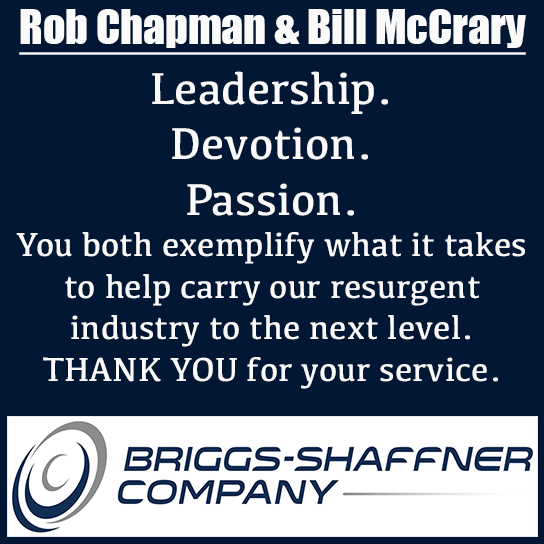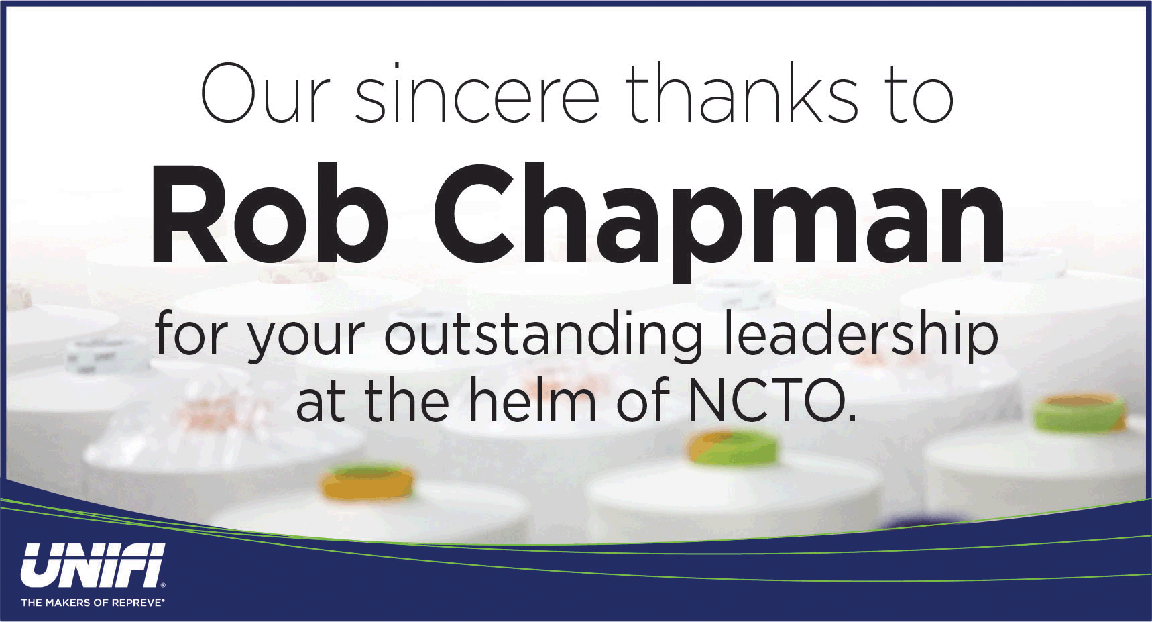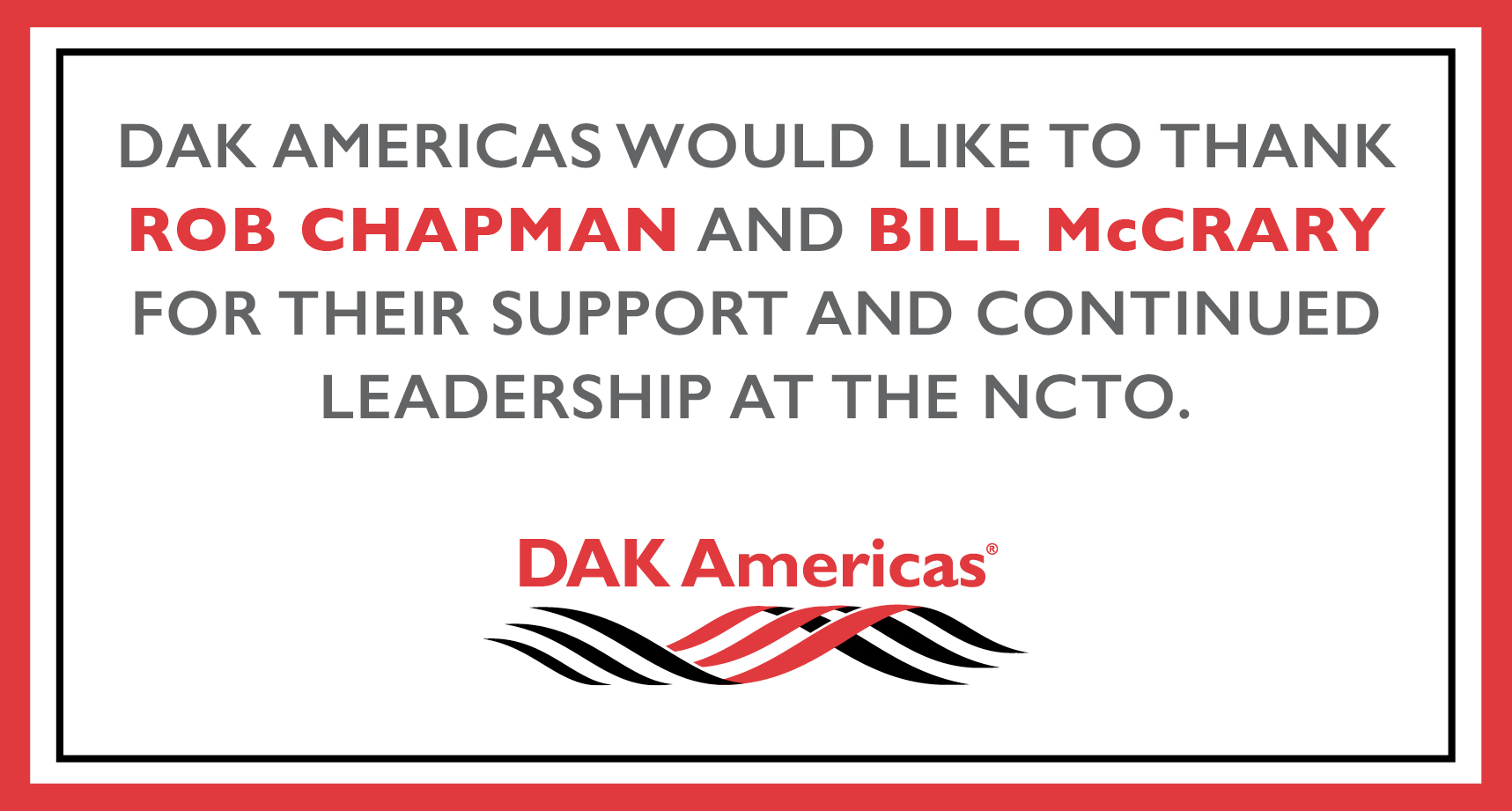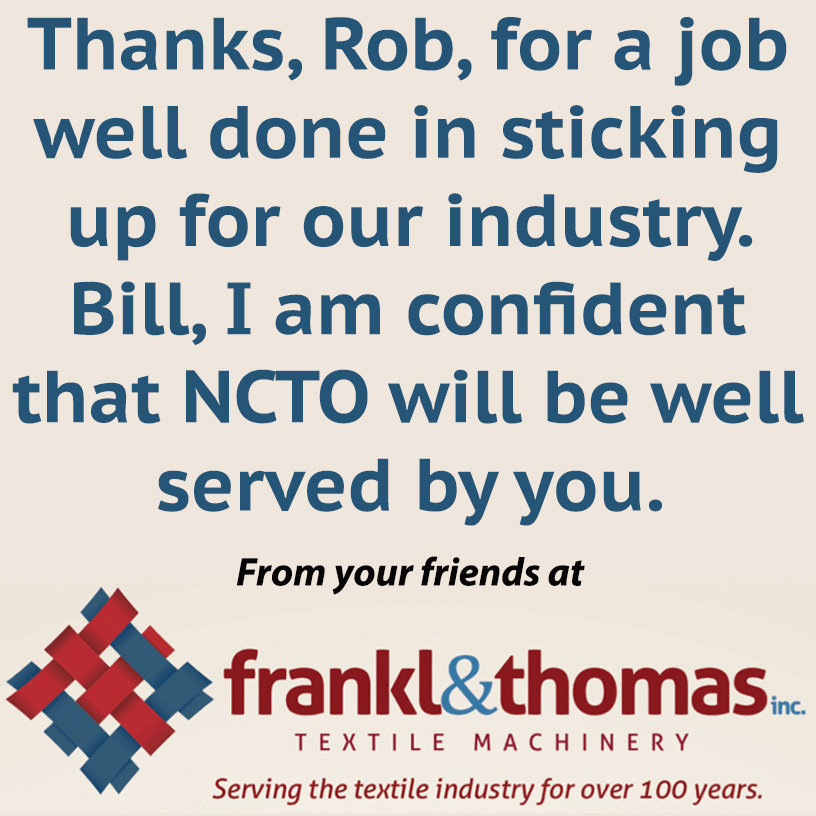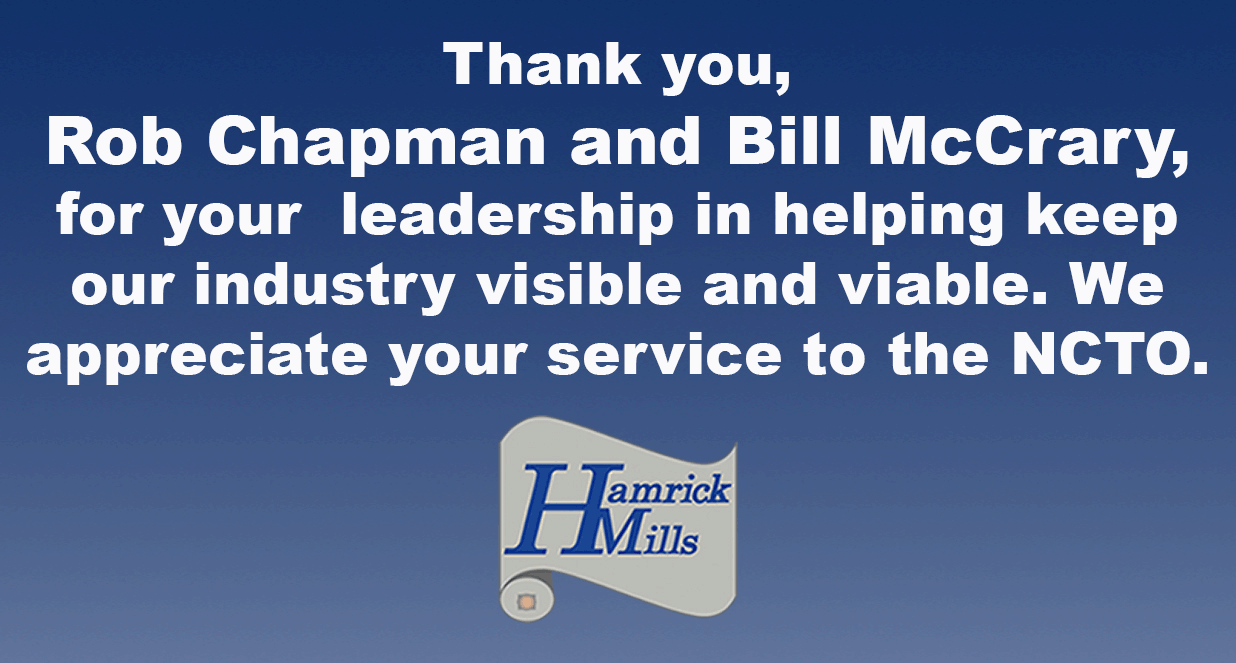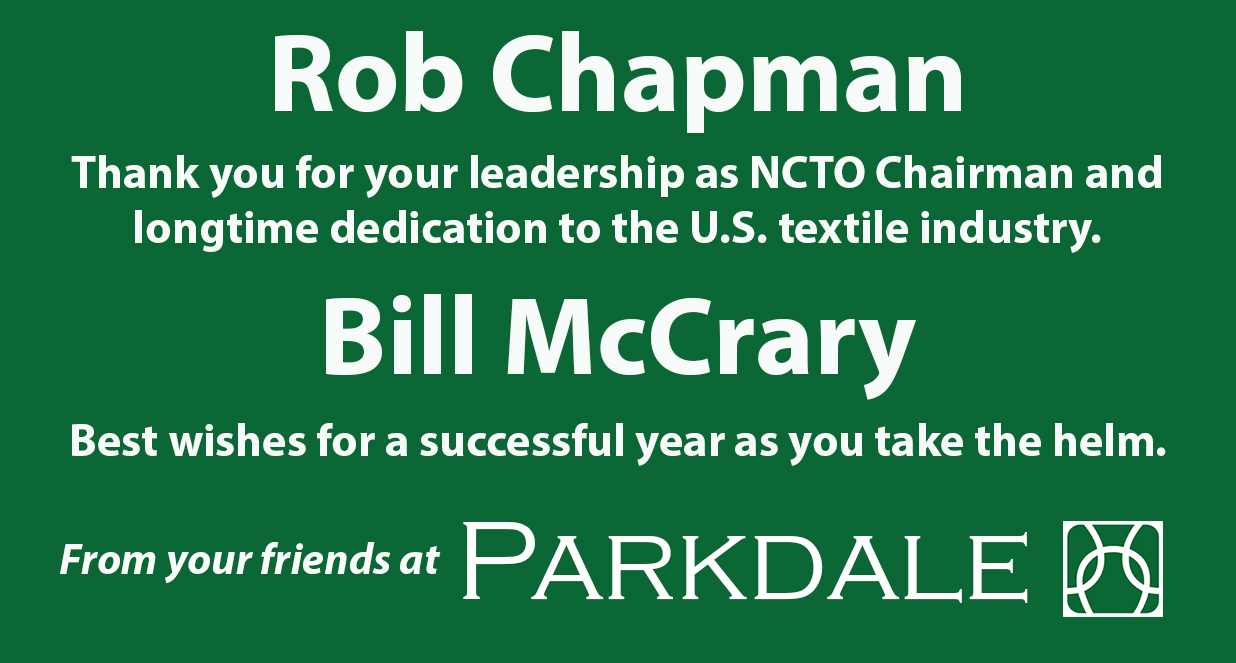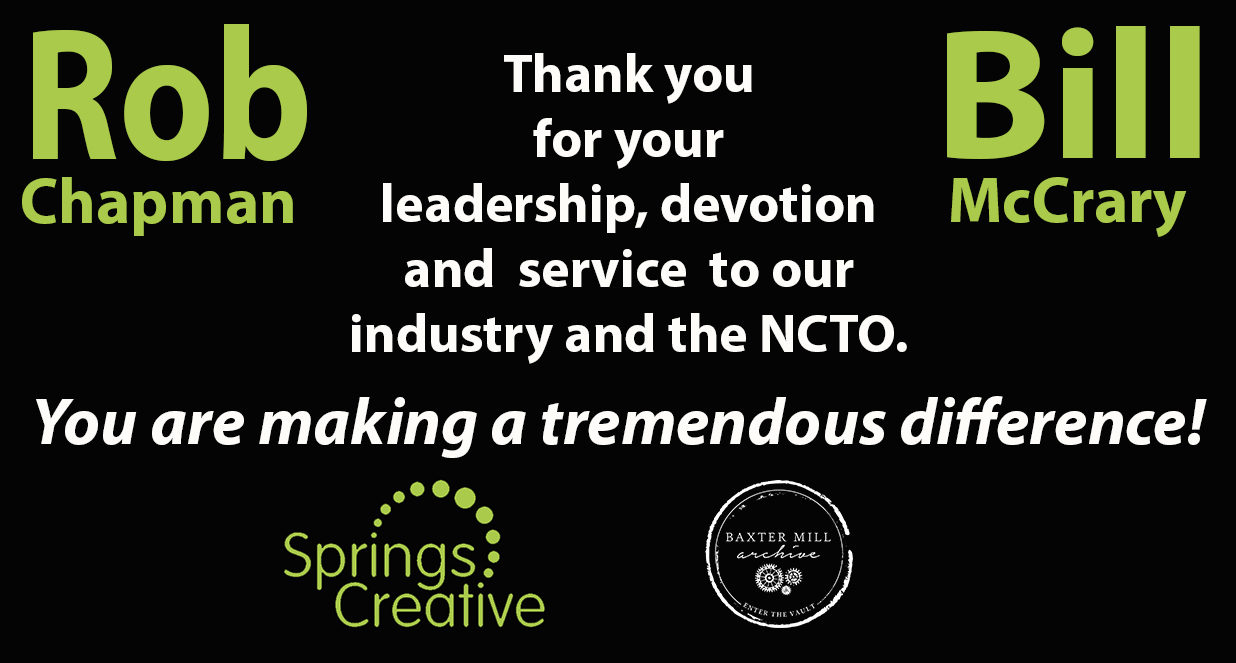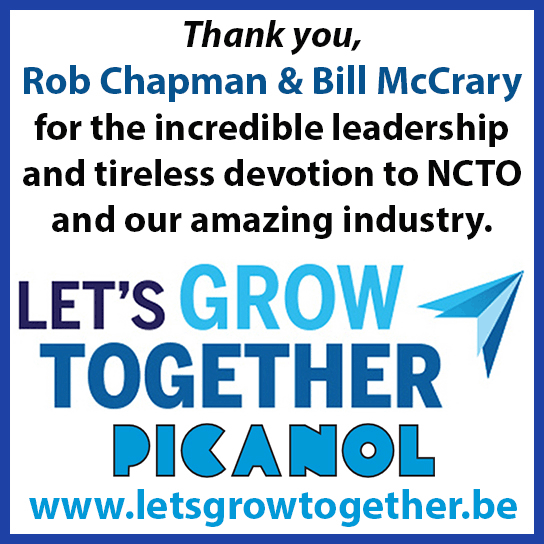
Posted March 15, 2017
Editor’s note: In advance of the National Council of Textile Organization’s (NCTO’s) 14th Annual Meeting, eTextileCommunications.com caught up with NCTO Chairman Robert “Rob” H. Chapman III, chairman, CEO & treasurer of Inman, S.C.-based Inman Mills. His responses to questions submitted by eTC’s Devin Steele are below. The council meets March 21-23 in Washington, D.C.
eTC: Rob, what has it meant to you to serve as NCTO chairman this past year and to lead the industry in such a high-profile role as it continues to increase its visibility and viability?
Chapman: It has been a privilege to serve as NCTO’s chairman this past year. It was also a challenging 12 months as the content and fate of the Trans-Pacific Partnership (TPP) were being decided and other key policy initiatives were being debated. Having been associated with this industry for more than 40 years, I am honored that the U.S. textile industry allowed me to serve in this key role at such a critical time in Washington, D.C.
eTC: While the 2016 election result was a rude shock to the Washington establishment, what was the U.S. textile industry’s reaction? What are NCTO’s policy priorities, and what outreach has been undertaken to forge a productive working relationship between the U.S. textile industry and the Trump administration?
Chapman: While I would let individual NCTO members speak for themselves, NCTO in general is very pleased with President Trump and several of his administration’s policy initiatives. Sensing an opportunity for a vastly improved policy environment for U.S. manufacturing, the NCTO staff began regular interaction with the Trump team almost immediately after the election in November.
As a trade association representing U.S. producers, NCTO has communicated its appreciation of the enormous value the president is assigning to domestic manufacturing. Noting the president’s baseline support of U.S. industry, NCTO strongly favors his desire to improve the overall tax and regulatory climate for business. NCTO also believes that U.S. trade policy must be changed to reflect the reality of the 21st century. America can no longer afford to grant generous and often unreciprocated U.S. market access to countries that subsidize their manufacturing base, dump products on the global market and hide behind insurmountable barriers such as a purposely undervalued currency.
Finally, NCTO absolutely agrees with the president’s call for much stricter enforcement of our trade laws and agreements. We must aggressively pursue and penalize those that would purposely undervalue their shipments to the U.S. market or who illegally access duty free benefits through our free trade agreements. Penalties for Customs fraud must be assessed in a manner sufficient to deter this highly damaging, illegal activity.
eTC: Momentum for the Trans-Pacific Partnership, a multilateral trade agreement between the United States, Vietnam and 10 other countries, stalled right as Congress was primed to vote on it. Noting that NCTO worked diligently on TPP for almost a decade and ultimately endorsed the deal, what is the U.S. textile industry’s reaction to President Trump’s decision to withdraw from the agreement?
Chapman: Frankly, NCTO was pleased to see President Trump formally withdraw from TPP as one of his first executive actions.
Certainly, NCTO was thankful to the Obama Administration for working with us to secure crucial provisions in the TPP. These included:
-
a strong yarn-forward rule of origin for the vast majority of products;
-
reasonable duty phase-outs (10-12 years) for most sensitive products;
-
overall provisions that will maintain a stable Western Hemisphere production chain; and
-
Customs provisions that capture the critical enforcement aspects of previous agreements.
Obviously, NCTO had to leverage its political strength and potential support of the agreement to get those essential provisions included in the agreement. That’s what led to NCTO’s support for TPP early last year.
The election, however, brought about a complete reversal of the TPP landscape. The new president has a concerted focus on nurturing U.S. production and a willingness to question whether past policy initiatives are in America’s best interest. NCTO supports this new approach and believes that President Trump’s decision to pull out of TPP is part of that bigger strategy, which NCTO feels is also good for the U.S. textile industry.
eTC: President Trump also wants to renegotiate NAFTA, the multilateral free trade agreement between the United States, Canada, and Mexico. Noting that U.S. exports to Mexico and Canada total more than $11 billion, what does NCTO want if the textile chapter in NAFTA is reopened?
Chapman: NCTO strongly supports the continuation of NAFTA, due to the valued partnerships the U.S. industry has developed since the agreement’s enactment. At almost $11.5 billion combined, Mexico and Canada are the U.S. textile industry’s two largest export markets.
NCTO agrees with President Trump that NAFTA is due for a detailed review to determine which aspects of the agreement may be working and which may no longer be warranted. As noted earlier, NCTO prizes the yarn-forward rule of origin and has a longstanding position of opposing exemptions to yarn forward. NCTO certainly will want to engage with the Trump administration to see whether improvements to NAFTA can be made that will boost U.S. textile production and employment.
Finally, NCTO strongly endorses President Trump’s call for much tougher enforcement of America’s trade agreements. Trade deals, such as NAFTA, grant very lucrative duty-free preferences. Unfortunately, these extremely valuable duty breaks also serve as a significant enticement for would-be cheaters. With respect to Mexico, Canada, the DR-CAFTA region and America’s other trade agreement partners, NCTO is confident all parties will benefit from a greater focus on the enforcement of NAFTA and other U.S. trade agreements.
eTC: President Trump repeatedly has said that his administration will “buy American and hire American.” The Berry Amendment is a statute that requires the Department of Defense (DOD) to buy textiles and apparel with U.S.-only content assembled in the United States. What is NCTO’s position on whether Congress should enact more Berry-like laws with respect to federal procurement of textiles and apparel that would apply to non-DOD spending such as infrastructure and the like?
Chapman: NCTO is proud of its steadfast efforts to defend and strengthen the Berry Amendment. This buy American provision for the military is an excellent example of how the government and the private sector can work together to the benefit of one another. The U.S. military benefits from a secure, U.S. supply line for thousands of superior quality and highly advanced products. In return, the domestic textile sector receives $1.5 to $2 billion in annual Defense Department sales that help to boost U.S. investment and employment.
Assuming the Trump administration and Congress are serious about wanting to buy more American or enact Berry-like laws applying to other federal agencies, NCTO would aggressively seek a seat at that table. As demonstrated through the Berry example, making sure the U.S. government buys “American” is good for the U.S. textile industry and even better for America.
eTC: Two years ago, then-NCTO Chairman Jay Self of Greenwood Mills announced the launch of a P.R. campaign aimed at branding the industry as a “technology driven, capital-intensive innovator of high-quality products that is fully competing in the 21st century global marketplace.” Can you give us an update on this effort?
Chapman: Thanks to a lot of hard work by many people, the NCTO-led "American Textiles: We Make Amazing" rebranding campaign is slowly but surely challenging outdated perceptions of the U.S. textile sector.
American textile manufacturers have a great story to tell. Our country’s industry is world class, as evidenced by the fact that U.S. textile supply chain exports totaled $26.3 billion in 2016. The sector is using the most cutting-edge production processes, investing in the best machinery, a leader in sustainability, and an innovation powerhouse.
While 2015 was dedicated to theme and content development, 2016 was all about rollout, including:
-
the publication of the inaugural edition of Textures, NCTO’s member magazine;
-
regular PR outreach to selected media;
-
a paid electronic search ad and media advertising campaign;
-
a Twitter, Facebook, and LinkedIn planned social media campaign;
-
a revitalization of NCTO’s member-only email communications, the weekly Textiles in the News and quarterly NCTO Newsletter; and
-
a revamped NCTO website, www.ncto.org.
Judging by the earned media and social engagement generated by "American Textiles: We Make Amazing" marketing efforts, more and more people are hearing the good news and viewing the U.S. textile industry in a new light.
eTC: As far as the annual meeting agenda, what can attendees expect to learn and discuss this year?
Chapman: NCTO is excited about the jam-packed schedule we are assembling for the 2017 NCTO Annual Meeting.
The afternoon of Tuesday, March 21, will begin with a focus on the Berry Amendment issues and government contracting policy. Brigadier General Charles Hamilton, Commander, Defense Logistics Agency – Troop Support, will outline military textile acquisition priorities. Eric Spackey, chief marketing officer of the Advanced Functional Fabrics of America (AFFOA), will follow with an update on that organization’s activities.Later, NCTO will hold individual council meetings to set organizational policy for the upcoming year.
Evening activities commence with a speech by U.S. Representative Trey Gowdy of South Carolina and culminate with NCTO’s annual networking reception and dinner.
Wednesday, March 22 will kick off with a briefing from the Office of the U.S. Trade Representative and a Textile PAC update. Next, NCTO members will head to Capitol Hill to discuss industry priorities with key members of Congress. An evening congressional reception concludes the day.
The last day, Thursday, March 23, will feature the 2017 state of the industry address and a roster of distinguished speakers that will focus on how various macro policy issues may play out under the Trump Administration:
-
Dr. David Hinks, dean of the North Carolina State University College of Textiles, will address industry workforce challenges;
-
Kevin Leahy, Duke Energy’s environmental and energy policy director, will discuss energy policy and its impact on U.S. textile manufacturing;
-
Carolyn Lee, senior director of Tax Policy for the National Association of Manufacturers (NAM), will talk tax reform; and
-
Nora Todd, senior policy advisor to U.S. Senator Sherrod Brown of Ohio, and Tyler Rushforth, former counsel to the U.S. Senate Committee on Environment and Public Works, will hold a panel discussion on the revitalization of America’s infrastructure.
The annual meeting then will close with the installation of NCTO’s new chairman for 2017.
eTC: What is your “elevator speech” for prospective members and why they should join and get involved?
Chapman: The opportunity to influence federal policies has never been better. There is a business-friendly president in the White House who has made it clear that expanding U.S. manufacturing and its workforce is a national priority. NCTO is eager to partner with President Trump and to help him deliver on campaign promises associated with everything from tax reform to the development of a 21st century trade policy. The U.S. textile industry has a tremendous amount at stake and every company serious about wanting a seat at the table in shaping these important federal policies should join NCTO.
eTC: For the fourth consecutive year, a South Carolinian will hold the NCTO chairman’s gavel, with Bill McCrary of William Barnet and Son LLC next in line to be elected at the annual meeting. With you having worked closely with Bill, what perspective and leadership ability does he bring to the table?
Chapman: Bill is a great advocate for the U.S. textile industry and is extremely well prepared to take on this role. He just completed a term as chairman of the American Fiber Manufacturers Association (AFMA). In addition to serving as NCTO’s vice chairman, Bill also chairs NCTO’s Fiber Council and the NCTO TextilePAC Committee.
Finally, Bill has toiled in the U.S. industry for more than 45 years. He knows the challenges facing American textile manufacturing and is dedicated to resolving them. NCTO will be in good hands when he takes over as chairman.
NCTO’s 14th Annual Meeting
Chairman Chapman discusses TPP,
Trump, council's agenda/focus



"Sensing an opportunity for a vastly improved policy environment for U.S. manufacturing, the NCTO staff began regular interaction with the Trump team almost immediately after the election in November."
Rob Chapman
NCTO chairman

"NCTO is eager to partner with President Trump and to help him deliver on campaign promises associated with everything from tax reform to the development of a 21st century trade policy. The U.S. textile industry has a tremendous amount at stake and every company serious about wanting a seat at the table in shaping these important federal policies should join NCTO."
Rob Chapman
NCTO chairman


